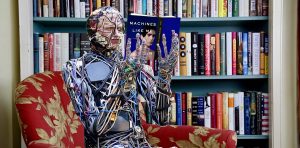Here’s an interesting snippet from Washington Post Book Editor Ron Charles’s email newsletter:
The next audiobook you hear might sound like the voice of an actor you recognize — but the narrator could actually be a robot. A British company called DeepZen has developed “emotive voice technology” that uses artificial intelligence to replicate particular human voices for audiobook productions. (“Alexa, do you feel threatened?”) DeepZen claims it can reduce traditional audiobook production from 60 days to seven, while creating a finished product that is “virtually indistinguishable from traditionally narrated audio.” (Listen to a digitally replicated voice narrate Franz Kafka’s “The Metamorphosis.”) The process begins by “mapping” samples of an actor’s voice. Then a computer uses that voice to “read” a book. Finally, human editors tweak the recording’s inflections as needed. Luddites may think this sounds like the textile workers being replaced by automatic looms, but DeepZen co-founder Kerem Sozugecer tells me that his company’s voice technology will provide a new source of income for narrators. DeepZen pays actors to sample their voices and then pays additional licensing fees every time their “voice map” is used to create a new audiobook. A narrator who now records, say, 10 books a year could in this brave new world be paid for voicing hundreds of books a year —without doing any actual work at all. Resistance, I hear, is futile. DeepZen has just released its first selection of AI-narrated books. Appropriately enough, the list includes Mary Shelley’s “Frankenstein.”
